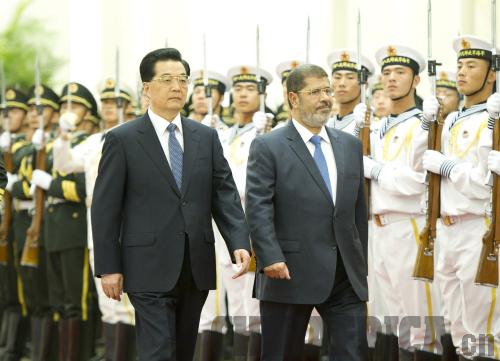|
 |
|
FIRST VISIT TO CHINA: Chinese President Hu Jintao welcomes visiting Egyptian President Mohamed Morsi in Beijing on August 2 |
Egypt's President Mohamed Morsi was accompanied by more than 80 Egyptian business people on a trip to Beijing in late August – a clear sign that the new Egyptian leader was intent on enhancing economic relations.
Walking on the red carpet alongside Chinese President Hu Jintao, Morsi's mind must have been on how China, a global economic power, could help Egypt wade through the economic quagmire that sparked the country's revolution and brought an end to the three-decade regime of former President Hosni Mubarak. Egypt's population is hopeful that life will be different under Morsi.
Challenges ahead
Egypt's problems are numerous. The World Bank projects that the economy will grow at 2.5 percent this year and at 3.5 percent in 2013. At a time when the country's growth rate needs stimulation to create jobs and put money in the pockets of citizens, this cannot be good news for Morsi.
Unemployment is soaring at 12 percent, and the World Bank has stated that there is "significant potential upward risk."
Foreign direct investment has been dwindling, and Bretton Woods puts the figure at $0.9 billion in 2011. International reserves have also been falling. There's also the little matter of a significant budget deficit approaching $36 billion.
"Egypt faces considerable challenges, including the need to restart growth and reduce budget and balance of payments deficits. Getting the country's economy back on track and raising the living standards for all will not be an easy task. The Egyptian people have legitimate expectations for a better life and greater social justice." That's how the Managing Director of the International Monetary Fund, Christina Lagarde, summed up the situation, after her visit to Egypt in August.
Rod Wye, an associate fellow for Asia, at Chatham House, a global think-tank, believes Morsi's trip to China was geared toward tightening ties with Beijing and addressing some of the points raised by Lagarde.
"I suspect that [Morsi] was hoping to win both commercial and investment contracts from China, which would help shore up the Egyptian economy as it strives to get going again," Wye told ChinAfrica.
"China is both a large potential market and a large potential investor for Egypt," he added.
In this regard it was a big help to both countries that Chinese investors remained in Egypt during the revolution.
Peter Wanyonyi, a Kenyan information scientist based in the Middle East, with deep grounding in international affairs, echoed the views of Rod Wye. Wanyonyi said of particular interest to China was Egypt's control of the Suez Canal – a key artery for Chinese vessels to get into the Middle East and the European market.
Morsi's decision to venture into China so early in his administration, actually, his first trip outside the Middle East, signals a shift in foreign policy that unlike Hosni Mubarak, whose first instinct was to always look West, he was ready to look East, and might do so, for some time to come. The United States finds itself now vying for influence over its traditional ally in the Middle East.
|